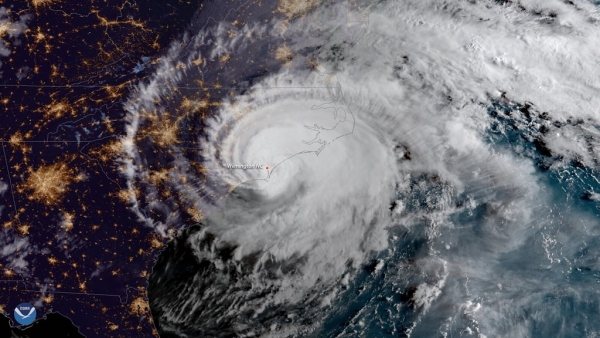
The Atlantic hurricane season runs from June through November and this year researchers at NC State predict we’ll experience a “normal” hurricane season. Based on historical data, that means the Atlantic coast should see between 13 and 16 named storms, five to seven of which may grow into actual hurricanes. Of those, two or three are likely to have the possibility of growing into major hurricanes[1].
But as North Carolinians know, even one major hurricane can have devastating impacts for our communities. As we find ourselves in the middle of another hurricane season, I wanted to remind folks that Triangle Community Foundation has a role to play when hurricanes and other disasters happen, even when it’s not in our own backyard.
For the Foundation, a “disaster” is defined as any natural or manmade event resulting in the loss of life, resources, or rights for a significant portion of the population. For disasters that affect the Triangle, we work with Emergency Managers in our region’s counties, United Way of the Greater Triangle, our local Red Cross chapters, and other relevant organizations to help determine the best way to coordinate raising and distributing donations to support relief and recovery. We do this to also ensure the best and most streamlined communication to our donors and the broader community. Triangle Community Foundation can also activate its own disaster relief fund if staff determine a significant impact in the Triangle.
For disasters that impact other places in North Carolina, or outside North Carolina, we work with other community foundations local to the event to determine whether a disaster relief fund has been activated. If so, we’ll advertise these resources on our website, our social media channels, and through email communications with our donors.
Last year when Hurricane Florence hit, we created an information-sharing page on our website to better understand the needs on the ground and how donations and other resources could best be deployed. Then, we got that information out to our donors through emails, our website, and social media, and they quickly responded.
But disaster recovery takes a long time. Communities across eastern North Carolina are still addressing issues caused by Hurricane Florence and even Matthew, which hit in 2016. I recently had the honor of attending an event hosted by the Resourceful Communities Program of The Conservation Fund, highlighting the recovery efforts of nonprofit organizations in places impacted by Hurricane Florence in 2018.
And overwhelmingly the message was that that recovery is a long-term process. The places hit hardest by Florence (and Matthew, and Floyd, and Irene…) are among the most economically distressed counties in North Carolina. Saving for emergencies, evacuating when dangerous weather is approaching, or repairing a home after the fact just isn’t a reality for many people here. Although government support is available through places like the NC Office of Recovery and Resiliency, nonprofit organizations in communities impacted by hurricanes play an important role by helping communities prepare, coordinating immediate response efforts, and connecting people with resources long after the hurricanes have passed to support long-term recovery. For example:
· Wash Away Unemployment provides job training and placement for people who were formerly incarcerated. Through a partnership with Habitat for Humanity these folks are retrofitting a building so it can be a temporary home to 16 people impacted by Hurricane Florence in Craven County.
· After Hurricane Matthew the State-recognized Coharie Tribe (Harnett and Sampson Counties) launched their Great Coharie River Initiative which helped young adult tribal members learn stream restoration skills. Even though Hurricane Florence was worse than Matthew, floodwaters receded more quickly last year thanks to this stream restoration work.
· Episcopal Farmworkers Ministry in Sampson County addressed immediate needs after Florence, providing $200 gift cards to more than 60 families for rent assistance or home repairs. But because many people were unprepared for the storm, EFM is preparing for the next disaster by launching a “promotora” program to train people to be prepared when a future disaster should strike.
· Young people are taking on leadership roles in these nonprofits. Chance and Anthony with Men and Women United for Youth and Families in Bladen County helped support “Operation Air Drop” to get food and supplies flown in and distributed in the days after Hurricane Florence. Former migrant workers themselves, Yesenia and other young leaders with NC FIELD advocate for migrant farmworkers and shed light on the lack of laws holding farm owners accountable for keeping farmworkers safe during a hurricane.
· Locally, The Green Chair Project is helping people whose homes were damaged by Hurricane Florence by inviting them to their showroom in Raleigh to pick out new furniture and decorations to help make their houses feel like home again.
We sincerely hope that this hurricane season is free from major storms that bring more damage and devastation to North Carolina communities. But we’re prepared to support coordinated, equitable response and relief efforts if it isn’t. We hope you’ll join us in supporting nonprofits who are helping people stay safe in the days after a disaster and who continue to be there, providing services long after the hurricane has dissipated.
[1] https://news.ncsu.edu/2019/04/hurricane-forecast-2019/
Contributing staff writer is Sarah Guidi, Program Officer for Triangle Community Foundation.
